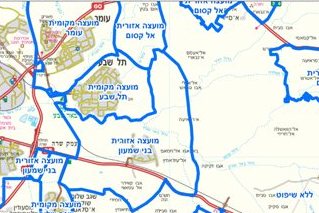
Interior Ministry announces appointment of Arab members to committees of inquiry on redistricting and revenue sharing in the Negev
As a result of a petition filed by the Association for Civil Rights in Israel (ACRI), the Interior Ministry of Interior announced today (January 2) that Arab representatives have already been appointed to two of the Ministry’s three committees of inquiry on redistricting and revenue sharing in the Negev, and that an Arab representative is in the process of being added to the third.
The ministry notified the Court and ACRI that it began searching for Arab committee members following ACRI’s petition, stating “The Ministry of Interior accepts that there is a basis to appoint Arab members to the committers of inquiry,” and citing the “broad mandates of these committees and wide influence of their work.”
The Interior Ministry announced the creation of three committees of inquiry in July 2013 to examine the municipal boundaries of the regional and local councils in the Negev and their respective control over “revenue generating” regions that house industrial zones, tourist attractions and infrastructure. The committees were commissioned to recommend changes to the councils’ boundaries that will facilitate more equitable distribution of revenues among the different councils of the Negev. Seven members were appointed to each of the inquiry committees, and none of them was Arab.
The petition, filed with the High Court of Justice on December 19, 2013 by ACRI Attorney Nisreen Aylan, argued that the failure to appoint Arabs to the committees constitutes a violation of the right of equal representation for Arab citizens in public bodies and committees.
The regions being examined by the committees include the Bedouin townships of Kuseife, Segev Shalom and Ar’ara, as well as the communities of the Al-Kasom and Neve Midbar Regional Councils. These communities are all consistently ranked at the bottom of socio-economic indicators. All lack industrial zones or tourist attractions, and most do not have land reserves for future development and expansion. Moreover, a large percentage of the residents of these towns live in poverty and receive arnona (municipal tax) subsidies, further weakening the revenue base. It’s therefore no surprise that all these communities carry budgetary deficits and require balancing funds from the Interior Ministry.
Attorney Nisreen Aylan: “It is nice to discover that in this case the Minister of Interior was receptive to criticism and even acted to change the situation. I hope that gradually more and more government offices will internalize the importance of equal representation of minorities and disadvantaged groups – like Arabs and women – that have been excluded from the corridors of power and decision making for decades; and more over, that they will adopt an organizational culture that takes into account the particular interests of minority groups that have suffered from discrimination.”
Related Materials
The full petition (in Hebrew).
The State Attorney’s response on behalf of the Ministry of Interior (in Hebrew).







